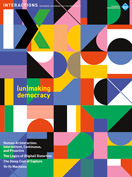Authors:
J. Khadijah Abdurahman, Sucheta Ghoshal, Daniela Rosner, Alex Taylor, Mikael Wiberg
This issue is a call for a careful consideration of the relationship between democracy and design. Rather than treat democracy as a universal good or moral value, what would it mean to examine it as integral to the complex ideological work of policymaking, practical reform, and dreams deferred?
The (white) Western academy typically indoctrinates us with a myth of democracy that almost always starts with a lesson on the Greek roots of democracy. The Greek word demos—the semantic origin of democracy—translates to the whole citizenry living in a particular city or state, while kratos translates to power or rule. Democracy, therefore, is presented to us as a system of governance performed by the people, and not just for the people. In practice, however, democracy is always limited to those with access to and trust in the system itself—those deemed eligible, law-abiding, righteous, and human. Even the Greek ideal of democracy was practiced with an acceptance of slavery and exploitation [1]. We find it difficult to think about, never mind design, in service to a system that excludes so many from the category of human.
Rather than treat democracy as a universal good or moral value, what would it mean to examine it as integral to the complex ideological work of policymaking, practical reform, and dreams deferred?
This paradox continues to shape white, Western practices of design—in the academy and beyond. Across the past half decade of HCI scholarship, analysts have deployed a discourse of democracy to pose an array of interventions, from programs of civic engagement to mechanisms of social control. During the 1970s and '80s participatory encounters within the Scandinavian workplace helped connect emerging technological developments with techniques of collective action. This turn to include the white working class in the design of technologies that governed their workplaces was an important step toward interrogating the means of production of technology. Yet it was an insufficient interrogation. Inheriting the white, Western spirit of democracy, this turn, too, never interrogated the logic of whiteness that drives democratic/meritocratic ideals of technology use in the first place.
Our relationship with both design and democracy drives us to do otherwise. We look at democracy critically through its making and unmaking. This critical examination is not only limited to the practice of democracy by our nation-states or institutions therein; we also question whether the theories of democracy mean to make space for anything other than whiteness at all. It is a frightening proposition, this inquiry, but Malcom X's comment that the American dream is a nightmare demands that we reckon with democracies designed to oppress most for the benefit of others.
The inaugural Otherwise School: Tools and Techniques of Counter-Fascism, held this past summer, reflections from which have helped shape this issue, began from that reckoning and proceeds with a method grounded in dreamscape. We (J. Khadijah Abdurahman and Sucheta Ghoshal) don't speak Greek or see a way forward in Greco-Roman notions of governance but it was never designed with us in mind. The libidinal underpinnings of democracy—or the desires and affect it evokes—perhaps are a placeholder or a trapdoor that we break through. We began the Otherwise School with this idea in mind. Our website states "our lexicon is insufficient"; we do not have enough words (and maybe English is a technology that forecloses an end to capitalism) to describe the situation we find ourselves in and the myriad ways in which we must break out. When we attune ourselves to the words of those denied inclusion into demos, we are at least afforded some initial prompts. Black women like Mariame Kaba, Andrea Ritchie, and Pauline Rogers have made "abolition thinkable," as Kaba emphasizes. Through the writings of B.R. Ambedkar, we can appreciate that Hindutva is not an anomaly of Hinduism but the logical extension of Brahminism or caste oppression encoded into its core makeup. We must annihilate caste, work toward the end of policing, and bring ourselves into relationship with one another through accountability and repair.
When exhausted, it is natural to seek refuge, to articulate the violences you've borne witness to. Instead of holding what those driven from their homes have seen, the United Nations High Commissioner for Refugees (UNHCR) collects their eyes into their biometric system. Whorls on war-torn fingers are captured and simulated into databases. Touch is denied. The innovation is remote-sensing satellites documenting from above and memorandums of understanding. Who needs intimacy when you have interagency data-sharing protocols? Maybe the human-computer interaction nomenclature is optimistic in that it preserves a distinction between human and computer. Or maybe it is a site of complicity, like a democracy that denies us as human while claiming to represent the interests of all people.
We are here; we exist in excess of the language used to justify our terror. Katherine McKittrick, drawing from Dionne Brand, describes "Black life as the work of psychically refusing the delimiting elapse of colonial spacetime" [2]. Explosion and sabotage is not just a design intervention of the warplanes flown under the mantle of democracy into Afghanistan. It is Black trans refusal to comply with gender categories or poetic excess that lives despite the best efforts of those deputized into policing categories of the human. It is also being born into apocalypse while being thought of as being the carriers of apocalypse. When your genesis is the aftermath, new conceptions of time and direction are made possible.
J. Khadijah Abdurahman, Sucheta Ghoshal, Daniela Rosner, Alex Taylor, Mikael Wiberg [email protected]
1. Ismard, P. Democracy's Slaves: A Political History of Ancient Greece. Harvard Univ. Press, 2017.
2. McKittrick, K. Dear Science and Other Stories. Duke Univ. Press, 2021.
Copyright held by authors
The Digital Library is published by the Association for Computing Machinery. Copyright © 2021 ACM, Inc.








Post Comment
No Comments Found